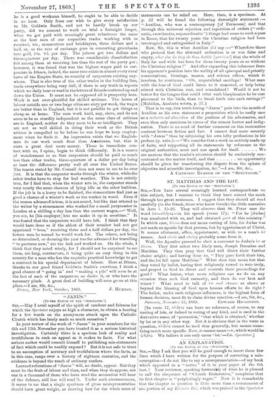" JANUS."
go THE EDrros OF THE "SPECTATOR,"]
Sut,—May I avail myself of the spirit of candour and fairness for which the Spectator enjoys so high a character, to obtain a hearing for a few words on the anonymous attack upon the Catholic Church which has lately made so much sensation ?
In your review of the work of "Janus" in your numbers for the 6th and 13th November you have treated it as a serious historical investigation. Certainly there is a specious look of reality and truthfulness in such an appeal as it makes to facts. For what serious author would commit himself to publishing mis-statements AN EXPLANATION.
of fact which could be readily exposed? But it is not safe to trust [TO THE EDITOR OF THE " SPECTATOR:I to an assumption of accuracy and truthfulness where the facts, as SIR,—May I ask that you will be good enough to insert these few in this case, range over a history of eighteen centuries, and the lines which I have written for the purpose of correcting a mis- evidence is beyond the reach of ordinary readers. conception—I do not like to say a misrepresentation—of my book Learned refutations of "Janus" will, no doubt, appear. But they which appeared in a " notice " of it in your paper of the 6th must be the fruit of labour and time, and when they do appear, not inst. ? Your reviewer, speaking favourably of what he is pleased one in a thousand of those who have read the accusation will hear to call the eloquence of "Church Restoration," complains that of the defence, still less will read it. Under such circumstances, its first chapter is "perplexingly vague." Now it is remarkable it seems to me that a single specimen of gross misrepresentation that the chapter in question is little more than a restatement of should have great weight, as showing how far the whole mass of one portion of my Ecclesia Dei, which was praised in the Spectator
statements can be Tenet' on. Here, then, is a specimen. At p. 52 will be found the following downright statement :— "Auxilius, who was a contemporary [of Formosus] said that through this universal rejection and repetition of orders (" ordi- natio, exordinatio, superordinatio ") things had come to such a pass in Rome, that for twenty years the Christian religion had been interrupted and extinguished in Italy."
Now, Sir, this is what Auxilius did say :—" Wherefore those who pretend that the aforesaid ordination is or was false and empty, what else do they do than babble [garriunt] that the whole of Italy far and wide has been for these twenty years or so without the Christian religion ?" And after expanding this inference from his opponent's position into the nullity of all episcopal and priestly consecrations, blessings, masses, and solemn offices, which it involves, he continues, "Oh, unparalleled sacrilege! What man with the fear of God could listen to it unmoved, or help being stirred with Christian zeal, and scandalized? Would it not be better for the tongue that could utter such blasphemies to be cast piecemeal to the birds, than to break forth into such ravings ?" (Malawi, Analecta vetera, p. 37.) That is to say, this truth-loving "Janus" puts into the mouth of Auxilius as his own statement a proposition which he really uses as a reductio ad absurdum of the position of his adversaries, and even then only mentions in terms of the utmost horror and indig- nation. There is no need of further comment on this instructive contrast between fiction and fact. I cannot deal more severely with "Janus" than by subjoining his own lofty professions in his preface (p. xxix.) :—" We consider that a work so entirely made up of facts, and supporting all its statements by reference to the original authorities, must and can speak for itself We are anxious that the reader's attention should be exclusively con- centrated on the matter itself, and that no opportunity should be given for transferring the dispute from the sphere of objective and scientific investigation, &c."—I am, Sir, &c., A CATIIOLIC READER OF THE "SPECTATOR."


































 Previous page
Previous page